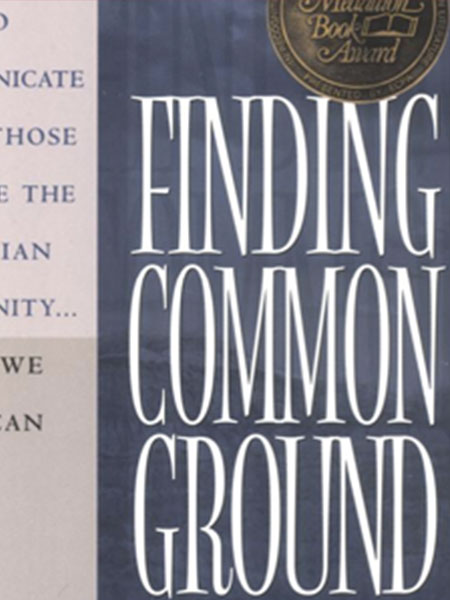Finding Common Ground
by Tim Downs
Evangelism is scary and intimidating, but it has an amazing pay off when you get to be there when someone actually finds Jesus for the first time in their lives. Unfortunately, not everyone in our lives is ready to accept Christ as soon as we meet them. Sometimes we have to put in some time and effort, listening and understanding, building bridges, and overcoming obstacles. And sometimes we don’t get to be the one to reap the harvest of the seeds of truth that we have been used by God to sow. Sounds kinda like a rough deal doesn’t it? If it sounds rough to you, I imagine it doesn’t sound very fun to your students either. But as Tim Downs points out in his book Finding Common Ground if no one is making the effort to sow, how can we keep expecting to have a harvest to reap? Someone needs to do the thankless jobs for the sake of the long-term game of saving the entire world.
Thankfully, Tim has helped this cause by writing a very well thought out and practically presented book explaining not only why we need to sow but also practical and effective ways to:
- Bring up spiritual subjects with busy and distracted people
- Use secular movies and books to talk about Biblical ideas
- Overcome prejudice and stereotypes in our listeners
- Keep open doors of communication with even hostile opponents
- Move everyone we meet a step closer to the Gospel
If you’re planning to help your students develop sowing skills (which you need to do!) then having them read this book can be a great first step. Then from there you can help them to begin applying all the practical advice in their lives right away. Maybe they’ll even get to reap some of what they sow!
Something to Keep in Mind
This book was published back in 1999 so in the past 15+ years, some things have changed. Tim’s message emphasizing sowing has gotten around. In fact, in many ways the idea of sharing Christ with someone before you’ve gotten to know them has gone out of fashion. However, as soon as we stop emphasizing this message, and building the skills needed for both sowing and harvesting, we’ll begin to become imbalanced again. There are a lot of great resources out there that help students bring someone to Christ, aka harvest. But this book is one of the few thorough and practical guides to develop the heart and skills needed for consistently encouraging the spiritual growth in the people around us, aka sowing.
Highlights of Tim’s Practical Tips for Sowers
Sowers Use Questions
“We’ve [Christians] got answers. The problem is, when we seem to have all the answers, we appear to be arrogant and dogmatic, and our listeners become resistant. Socrates took a different approach. Believing that the truth was on his side, he saw it as his job to ask questions of a world that thought it knew everything.”
Sowers Build Agreements
“An old principle of persuasion says, “The first purpose of a persuasive speech is to show that not much persuasion is needed.” In other words: A wise communicator seeks to build agreements, not arguments.”
Sowers Give Their Lives
“Thessalonica was a rough town for Christians, where opponents to the faith formed angry mobs and believers were dragged before the city authorities. Paul knew that in that kind of environment, it would never be enough to simply ask good questions or build common ground. He had to get personally involved; his love, concern, and assurance of ongoing support would make all the difference…”
Sowers Provide Materials
“The sower knows that books, tapes, and other materials could be very helpful in the ongoing process of sowing. She’d love to give a book to a friend, leave a tape with a co-worker, or encourage a neighbor to see a movie, all in the hopes of planting a few seeds of biblical worldview. But what book, tape, or movie?”
The Five Criteria for a Good Sowing Tool
- It must speak the unbeliever’s language.
- It must show an understanding of the unbeliever’s world.
- It must be intelligent and credible.
- It must raise good questions.
- It must have a reasonable persuasive goal.
These tips and much more are what await you and your students if you take the time to read this book together. It’s not the most fun read, but it may end up transforming your student’s personal ministry now, and for the rest of his or her life.


